Donkey for a Dinar
part 2
Nasruddin stroked his beard, as he did whenever he had some hard and fast thinking to do. Then he spoke, “Oh sure — but it’s too bad that the donkey bazaar is not held today. We will have to wait until Wednesday. At that time I will sell for a single dinar my donkey to the one of you that I think will make the best master.”
So for the next week Abdul and Mali went to great pains to demonstrate to Nasruddin how kind and generous they were to all the town’s animals. Abdul made a point of throwing handfuls of feed to birds while Nasruddin was looking, and Mali made a great show of brushing his many fine dogs and parading them about, and both men groomed and festooned and treated their own donkeys like royalty.
Come the day of the donkey bazaar, Mali and Abdul were anxious as to whether they each had impressed Nasruddin enough to make him sell his beloved donkey at such a bargain. The two men waited outside with everyone who also came to see the outcome.
Soon enough, a faint sound of donkey hooves could be heard approaching. After some time, the buyers realized they heard another noise, not so familiar, the sound of a somewhat displeased cat. They waited as the sound grew louder, until around the corner came the Mullah leading Karakacan by a tether, just as he had promised. Nobody expected to see, however, that tied to the tail of the donkey — was Nasruddin’s tawny cat.
Once everyone had gathered around this spectacle, Nasruddin announced, “I indeed am willing to sell my beloved donkey for one dinar. But my donkey and my cat — I mean, the donkey’s cat — are such good friends, it would be cruel to separate them. Whoever buys my donkey must also purchase her dearest feline companion.”
It only took two seconds for the would-be buyers to say, “How much for the cat?” in unison, reaching into their moneybags to grab another dinar or two.
“Oh, this is a very distinguished cat,” Nasruddin replied, gesturing to the distressed feline, which tried batting at the red ribbon tethering it securely to a big knot in the donkey’s tail. “Its past is exotic and fascinating. I know for a certain fact that her great-grandfather lived in the King’s palace. And that was from just this precious cat’s third life — still six more lives left.
“So,” Nasruddin continued, “as much as I hate to part with my dear kit— I mean, the donkey’s dear feline friend, the price of the cat is quite reasonable, considering her regal pedigree: one thousand dinars.”
Mali and Abdul looked at each other, and broke into wide grins, and everyone laughed. They hugged Nasruddin and slapped each other on the back and all were glad, because everyone knows that a man and his ass should never be parted.
Excerpted from The Uncommon Sense of the Immortal Mullah Nasruddin: Stories, Jests, and Donkey Tales of the Beloved Persian Folk Hero
 Your Daily Nasruddin
Your Daily Nasruddin 
Second, concluding part of a long Nasruddin story.
Turkey’s national currency is currently not the dinar. Nor is it the Euro: it is now the New Turkish Lira. The dinar is still used by many countries including Iraq, Tunis, Azerbaijan, Yugoslavia, and Sudan.
Although some Nasruddin stories portray cruelty to animals, this one demonstrates the Mullah’s uncommon love of his critters.

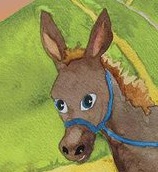
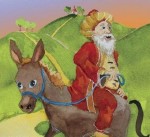
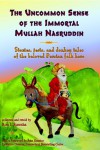
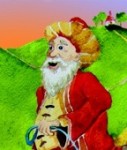

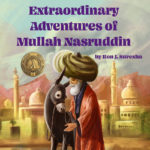
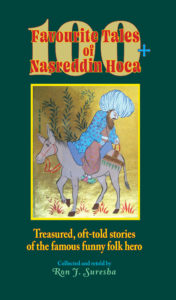
Never Miss a Bargain
Never Miss a Bargain
Excerpted from The Uncommon Sense of the Immortal Mullah Nasruddin: Stories, Jests, and Donkey Tales of the Beloved Persian Folk Hero
It’s not advantageous to be short, unless you’re in front.
Perceiving your own shortness is completely relative to your perception of others’ height.
Don’t buy anything you can’t see.